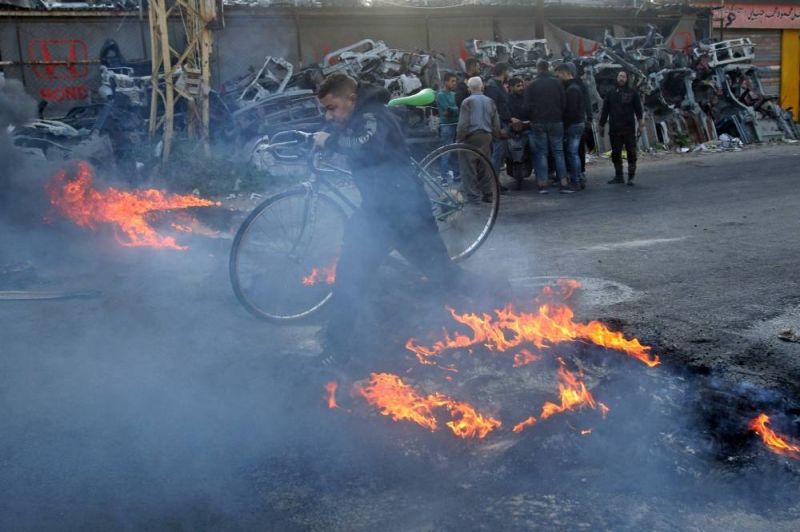
A cyclist crosses a burning barricade erected by protesters in the southern city of Saida on Wednesday. (Credit: Mahmoud Zayyat/AFP)
Want to get the Morning Brief by email? Click here to sign up.
Protesters hit the streets across the country again yesterday, albeit in smaller numbers than Tuesday, while the president asked why the Lebanese lira had hit a historic low. Demonstrations against mounting economic hardships were held in Tripoli, Beirut, Saida, Sur and Baalbeck, among other areas. In Saida, dozens of protesters forced several currency exchangers to close shop, chanting “Thieves, just like Riad Salameh,” the central bank head who has drawn the ire of activists. Salameh, for his part, met with Michel Aoun yesterday, who asked Banque du Liban’s governor to explain the lira’s recent plunge in value. The president also called for the prosecution of anyone allegedly involved in “illegal speculation against the national currency.”
Public transport fares have been hiked “temporarily,” piling on the economic hardships facing Lebanon’s most vulnerable. The Public Works and Transport Ministry approved Wednesday a 30 percent increase in prices, set for re-evaluation at the end of March, when the country’s COVID-19 lockdown is set to finish. Public transport drivers, many of whom depend on daily earnings, have held a series of protests over the lockdown period against worsening living conditions as they struggle to make ends meet amid rising fuel prices and a drop in customer numbers. However, the price hike also threatens to further hurt the livelihoods of the poorest members of society, who already have to contend with massive inflation in the cost of basic goods.
The World Bank’s deadline for the Health Ministry to begin disclosing data on its COVID-19 vaccination efforts expires today. The international organization, which is the main financier of Lebanon’s inoculation drive, wants the ministry to disclose allocations of shots to vaccination centers and the schedule of its mobile clinics. Scandal has swirled over Lebanon’s vaccination program after a Health Ministry team inoculated a dozen MPs on Feb. 23, an apparent breach of the vaccination drive that has angered the World Bank. Meanwhile, a judge ordered the Health Ministry to vaccinate an elderly man, or face financial penalties, Reuters reported. The judge argued the ministry’s vaccination of the MPs had violated the 80-year old man’s right to health. Sixty-one more COVID-19-related deaths were registered in Lebanon yesterday.
FPM deputies submitted a draft law to Parliament requesting LL1.5 trillion — $1 billion at the official exchange rate — in funds for Lebanon’s beleaguered state electricity firm. Cesar Abi Khalil, an FPM MP and former energy minister, told L’Orient Today the money was necessary for Électricité du Liban to import fuel for power generation and to cover its operational costs. On Feb. 23, the caretaker energy minister cautioned that without the emergency funding, Lebanon would not be able to acquire fuel to keep the lights on past March. The proposed advance payment represents 11 percent of the state’s forecasted expenditures in the 2021 budget proposal. Lebanon has suffered from longer-than-usual power cuts in past weeks due, in part, to difficulties unloading recent consignments of fuel for power plants.
Lebanon’s lead scientific organization will meet today with parliamentarians and ministers to discuss how to tackle the oil spill that ravaged beaches in the south. The National Council for Scientific Research’s head told our sister publication L’Orient-Le Jour that his organization’s report estimates 4-5 tons of tar spilled onto 30 kilometers of coast from Naqoura, near the border with occupied Palestine, northward to Adloun. “The work done by volunteers is magnificent, but is not enough,” Mouin Hamze added, in reference to clean-up efforts on southern beaches. The scientist called for state authorities to coordinate an emergency response with full-time clean-up efforts deploying at least 100 workers.